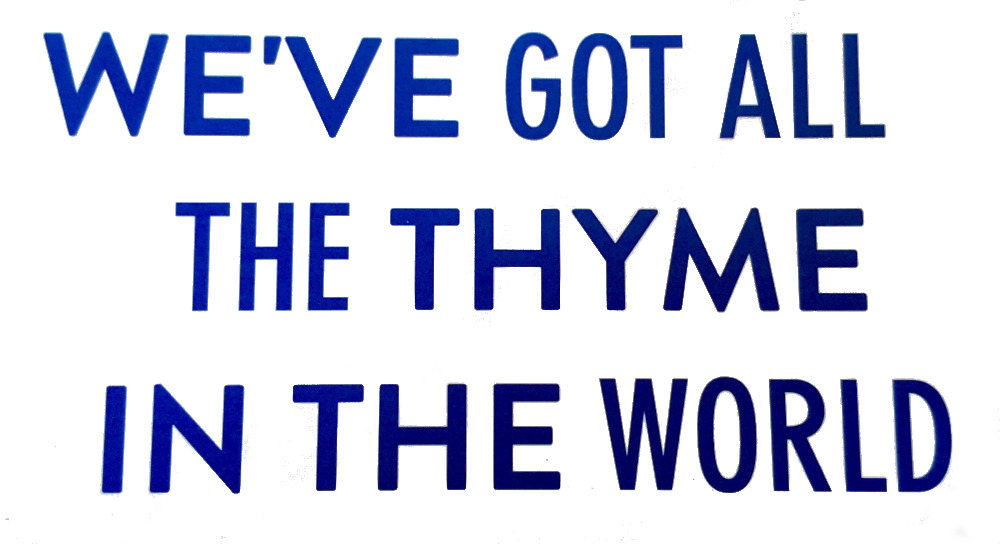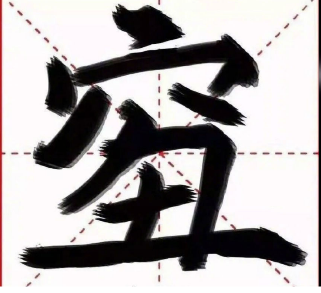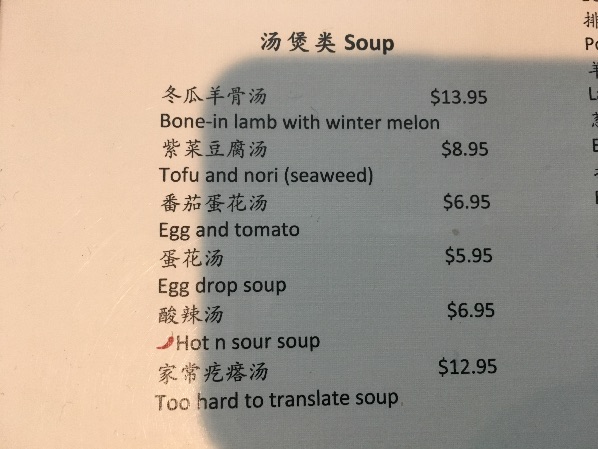Archive for Phonetics and phonology
A new Sinograph
On being ugly and poor, with an added note on consumerism.
Every so often, for one reason or another, somebody creates a completely new Chinese character. Here's the latest:
Read the rest of this entry »
A better way to calculate pitch range
Today's topic is a simple solution to a complicated problem. The complicated problem is how to estimate "pitch range" in recordings of human speakers. As for the simple solution — wait and see.
You might think that the many differences between the perceptual variable of pitch and the physical variable of fundamental frequency ("f0") arise because perception is complicated and physics is simple. But if so, you'd be mostly wrong. The biggest problem is that physical f0 is a complex and often fundamentally incoherent concept. And even in the areas where f0 is well defined, f0 estimation (usually called "pitch tracking") is prone to errors.
Read the rest of this entry »
Of knots, pimples, and Sinitic reconstructions
A couple of months ago, we talked about gēda 疙瘩, which is one of those very cool, two syllable Sinitic words, neither of whose syllables means anything by itself (i.e., not only is it a disyllabic lexeme, it is also a disyllabic morpheme). Furthermore, gēda 疙瘩 is highly polysemous, with the following meanings: "pimple; knot; swelling on the skin; lump; nodule; blotch; a knot in one's body or heart (–> hangup; problem; preoccupation)".
See "Too hard to translate soup" (9/2/18).
Read the rest of this entry »
The holy day of [??]
From Elijah Granet:
In Trump’s recent remarks on the Squirrel Hill synagogue shooting, he (at ~1:12 in the linked video) refers to the shooting taking place “on the holy day of Sabbath”, pronouncing “Sabbath” in a bizarre way, with the vowels completely off. My best guess—and a few people on Twitter seem to agree— is that the teleprompter actually said “Shabbat”, but Trump was unsure how to pronounce it, and ended up saying “Sabbath”. Still, it seems a bit strange since Shabbat is not a particularly hard word to read phonetically, and given that Trump’s daughter and son-in-law are shomer shabbos, one would think he had heard the word before. It’s equally possible that Trump didn’t know the word “Sabbath” and was trying to give it a “Jewish” pronunciation, and thus over-corrected.
The audio for the phrase "on the holy day of Sabbath":
And just the pronunciation of "Sabbath":
Read the rest of this entry »
Pinyin for phonetic annotation
One more reason for me to love Wikipedia.
I just noticed in this article on Chinese honorifics that some example sentences are phonetically annotated with Pinyin. Not only that, it observes properly spaced word division, which must be technically difficult to achieve. Furthermore, the Pinyin annotations are appropriately small, yet clear.
I don't know how widespread this usage has become in Wikipedia or elsewhere, but I can tell you that learning about it this morning brought me great joy.
Read the rest of this entry »
Word, syllable, morpheme, phoneme
What is the basic unit of discursive, communicative language — word, syllable, morpheme, or phoneme?
This topic came up in the comments to the following posts:
"The concept of word in Sinitic" (10/3/18)
"Words in Vietnamese" (10/2/18)
"Diacriticless Vietnamese on a sign in San Francisco" (9/30/18)
"Words in Mandarin: twin kle twin kle lit tle star" (8/14/12)
Read the rest of this entry »
LRNLP 2018
On Monday, I'm pursuing the quixotic enterprise of talking to an NLP workshop about phonetics.
LRNLP ("Language Resources for NLP") 2018 is a workshop associated with COLING 2018 in Santa Fe NM. My abstract:
Semi-automatic analysis of digital speech collections is transforming the science of phonetics, and offers interesting opportunities to researchers in other fields. Convenient search and analysis of large published bodies of recordings, transcripts, metadata, and annotations – as much as three or four orders of magnitude larger than a few decades ago – has created a trend towards “corpus phonetics,” whose benefits include greatly increased researcher productivity, better coverage of variation in speech patterns, and essential support for reproducibility.
The results of this work include insight into theoretical questions at all levels of linguistic analysis, as well as applications in fields as diverse as psychology, sociology, medicine, and poetics, as well as within phonetics itself. Crucially, analytic inputs include annotation or categorization of speech recordings along many dimensions, from words and phrase structures to discourse structures, speaker attitudes, speaker demographics, and speech styles. Among the many near-term opportunities in this area we can single out the possibility of improving parsing algorithms by incorporating features from speech as well as text.
Due to semester-initial commitments at Penn, I won't be able to stay for COLING, but I'm looking forward to an interesting day of presentations at the workshop.
All the thyme in the world
A small recent experience with herb-related synchronicity reminded me of some very interesting phonetics research.
 This all began a couple of weeks ago, when Larry Hyman and I were discussing what seasonings to use on meat to be grilled for dinner. I suggested thyme, and Larry reminded me of Suzanne Gahl's 2008 paper "Time and Thyme Are not Homophones: The Effect of Lemma Frequency on Word Durations in Spontaneous Speech":
This all began a couple of weeks ago, when Larry Hyman and I were discussing what seasonings to use on meat to be grilled for dinner. I suggested thyme, and Larry reminded me of Suzanne Gahl's 2008 paper "Time and Thyme Are not Homophones: The Effect of Lemma Frequency on Word Durations in Spontaneous Speech":
Frequent words tend to shorten. But do homophone pairs, such as time and thyme, shorten equally if one member of the pair is frequent? This study reports an analysis of roughly 90,000 tokens of homophones in the Switchboard corpus of American English telephone conversations, in which it was found that high-frequency words like time are significantly shorter than their low-frequency homophones like thyme. The effect of lemma frequency persisted when local speaking rate, predictability from neighboring words, position relative to pauses, syntactic category, and orthographic regularity were brought under statistical control. These findings have theoretical implications for the locus of frequency information in linguistic competence and in models of language production, and for the role of articulatory routinization in shortening.
Read the rest of this entry »
My poster for the "Prosody Visualization Challenge"
See "PVC 1" (4/20/2018) for background. I ran the 51 PVC 1 audio files through the scripts described in "Some visualizations of prosody" (10/23/2016), and ginned up a poster describing a few of the results.
Unfortunately poster-display technology doesn't yet include embedded audio playback, so this is an interactive version of the same content. [Note: the poster mistakenly describes example 1.b. as being from a Donald Trump interview, rather than being from his inaugural address.]
Read the rest of this entry »
Permalink Comments off
Plosives take over the New York Times Styles section
Just last week, Caity Weaver was waxing rhapsodic about Kim Cattrall's alveolar plosives in the New York Times Styles section:
When Ms. Cattrall says the word “didn’t,” she respects each and every D and T.
Indeed, it could be said that alveolar plosives — the consonant sounds made by tapping the tip of the tongue to the alveolar ridge, just behind the teeth, as when hitting one’s D’s and T’s — are some of Ms. Cattrall’s best work. She is a careful enunciator who takes time to pronounce distinctly every element of a consonant cluster. Her diction might be described as intricate.
(More from Mark Liberman here.)
And now the plosives are back, in a Styles article by Jonah Engel Bromwich about IHOP's curious rebranding as "IHOb" (which it turns out has to do with burgers).
P and b are both bilabial plosives, meaning that your mouth does the same thing when you make the sound of both letters. The difference is that “b” is voiced, which for some people, makes it sound funny or strange coming at the end of a word.
Read the rest of this entry »
Audiobooks as birdsong
Wonkier but more accurate title: "Generating the distribution of audiobook speech segment durations".
In "Finch linguistics" 7/13/2011, I observed that the distribution of birdsong motif repetitions indicates that the underlying process is non-markovian in a particularly simple way: the probability of adding another motif to a zebra-finch song is not constant, but rather is an exponentially-decaying function of the number of previous motif repetitions.
And in "Modeling repetitive behavior" 5/15/2015 (and posts linked therein), I suggested that this is likely to be a shared property of several sorts of repetitive behavior, primate as well as avian.
A few days ago, as a result of a conversation with João Sedoc and Tianlin Liu, I decided to apply the same idea to the distribution of speech-segment durations in (a locally re-aligned version of) the LibriSpeech corpus.
Read the rest of this entry »

